
How to Learn C++
C++ is a general-purpose programming language commonly used for operating systems development. You may also see C++ used for data science, especially for large-scale operations involving data. This language, first released in 1985, has stood the test of time and is used by a global community of developers.
In this guide, we’re going to talk about how you can learn C++. We will start by discussing what you need to learn. Then, we will talk about where you can go to learn C++.
What You Need to Know About C++
When you start learning C++, there are a few concepts to which you must pay attention. These concepts are the base upon which you build the rest of your knowledge. To help you figure out what you need to learn, we have compiled a short list of essential C++ concepts for beginners:
- Syntax: No matter what programming language you learn, you should begin by learning the syntax. This is best done through reading about and then implementing a “Hello World!” example, which is easy to understand for beginners.
- Variables: Variables are used to store data in a program. You will need to learn how variables work and how to store data in a variable.
- Data Types: You should learn all of the data types used in C++ and how to work with them. They include strings, numbers, and booleans.
- Conditional operators and loops: Conditional operators control the flow of your program and loops help you automate repetitive processes. You will need to learn both of these concepts.
- Arrays: Arrays store multiple values in one list. They come up all of the time in programming and are a must-learn concept for beginners.
- Functions: You should learn how to create a function and pass values to a function through parameters and arguments. You also need to learn how to return a value in a function.
- Object-oriented programming: Spend some time learning about classes, objects, and how object-oriented programming is implemented in C++.
These are only a few of the many concepts that you will need to learn. The above list gives you a good starting point as you begin to learn the C++ language.
Skills Needed to Learn C++
Many developers agree that C++ is a good programming language for beginners. While C++ syntax may not be as easy to read as that of a language like Python, with some dedication you should be able to learn C++ without first knowing another programming language.
C++ is widely documented, which means there is no shortage of resources from which you can learn, even as a beginner with no programming experience. However, knowing another language will help you learn C++ because most programming languages have similarities.
Why You Should Learn C++
C++ is a general-purpose programming language which means you will find the language used in a variety of settings. For instance, C++ is used for game development, data analysis, and systems engineering. Learning C++ will thus help you break into any one of these careers or another job that lists C++ as a requirement.
A major advantage of using C++ is the speed of the language. This is particularly important in data science use cases. Extensions built in C++ can execute quicker than in some other programming languages. This means that you can get a faster result from your program.
In addition, C++ has a massive community; you should have no trouble finding resources that will help you learn the language. There are plenty of websites and tutorials dedicated to beginner C++ concepts which you can leverage on your learning journey. The more resources there are, the easier it is to find answers to the questions you will have as you learn a programming language.
How Long Does it Take to Learn C++?
C++ has quite a difficult syntax. You can expect to spend about two to three months learning the basics of C++ and be able to use the concepts you have learned in your own programs. To pursue a career that uses C++ as a skill, you will need to spend at least six months learning. Naturally, the more you practice, the better you will get.
Learning C++: A Study Guide
There are plenty of resources online to help you learn C++. While this is on the whole a great thing, finding a place to start (or continue) your learning can be difficult. We have compiled a list of some of the best C++ learning resources to help you take the next step in your learning journey.
LearnCpp.com
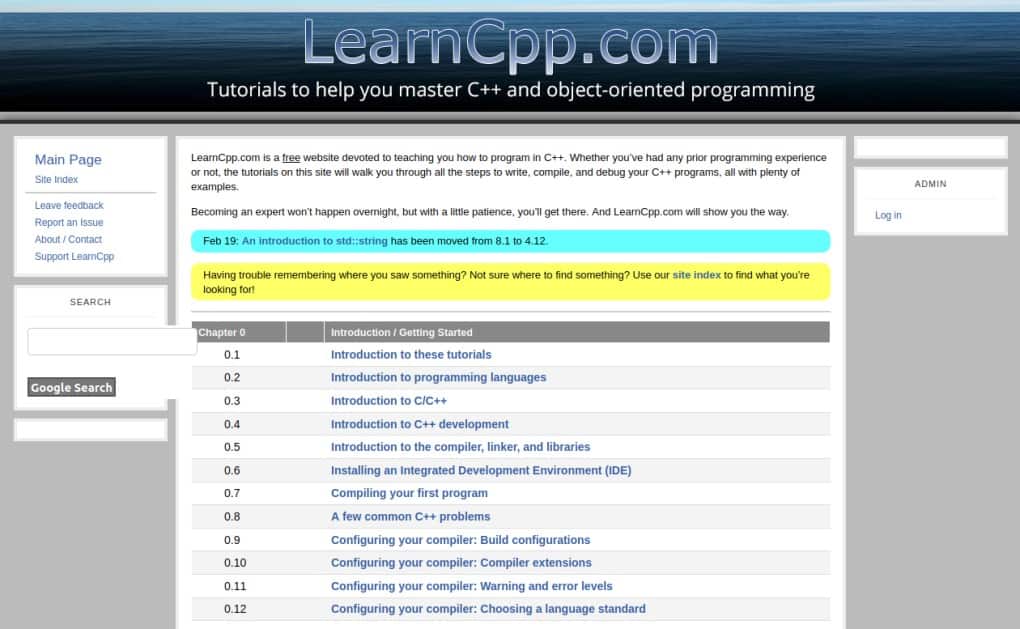
- Resource Type: Tutorial
- Price: Free
- Audience: Beginner with intermediate and expert tutorials as it progresses
LearnCpp.com features a wide range of tutorials on C++ which cover topics like variables, functions, debugging, data types, operators, and more. All of the tutorials feature code snippets and detailed explanations of concepts. The author of this site breaks concepts down step-by-step. You should have no trouble using this site even if you are a complete beginner.
Learn C++ by Codecademy
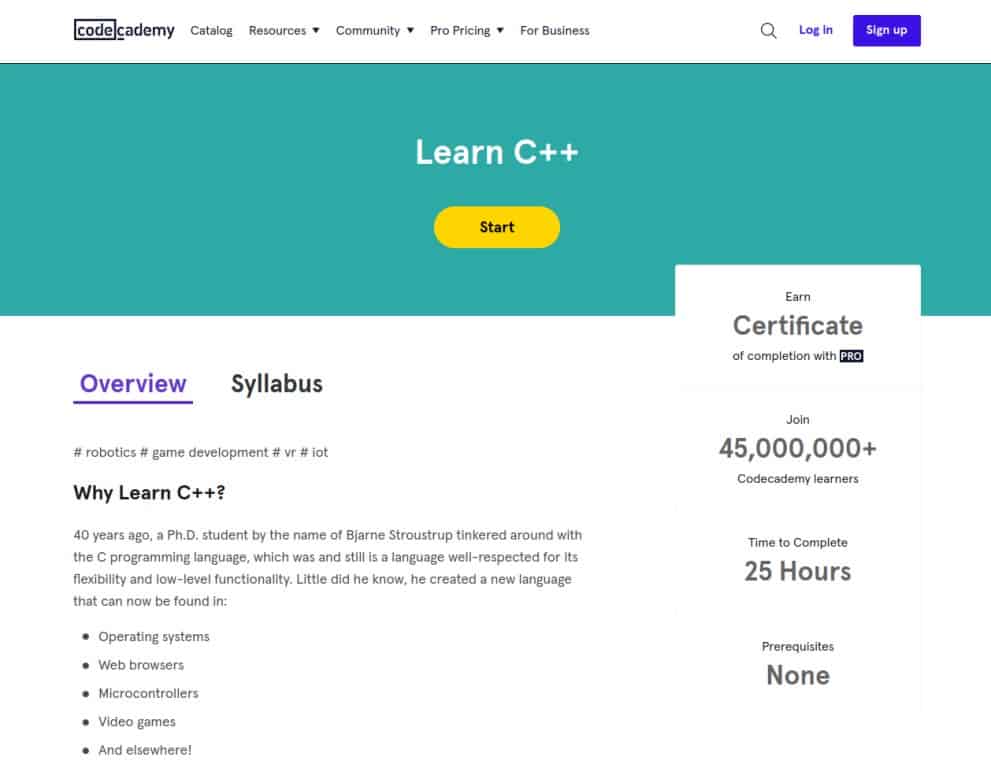
- Resource Type: Course
- Price: Free
- Audience: Beginner
The Learn C++ Codecademy course will help you master the basics of the C++ language. Starting with a “Hello World!” example, you will move on to concepts like loops, references, and pointers. You will graduate with an understanding of the fundamental concepts used in C++. This course is interactive and you can code in your browser, which will save you time setting up a development environment for the course.
C++ For Programmers by Udacity
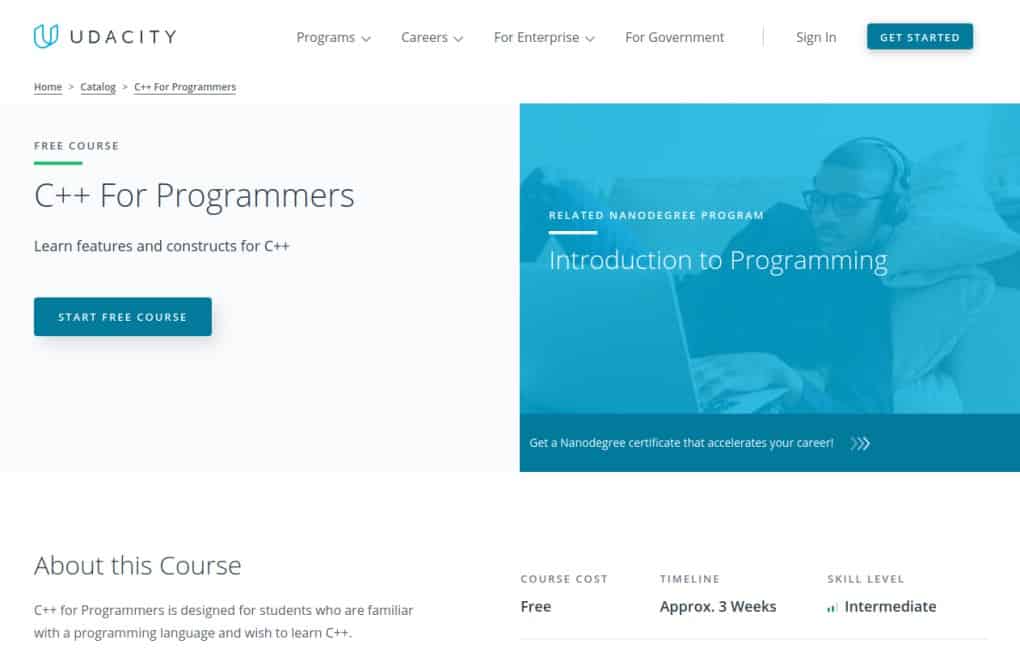
- Resource Type: Course
- Price: Free
- Audience: Intermediate
This course, offered by Udacity, is for people who already know a programming language but want to move on to using C++. It features quizzes and videos that cover many C++ topics, from classes and objects to using “if” statements. According to Udacity, you can expect to spend about three weeks working on this course.
Beginning C++ Programming by Tim Buchalka and Dr. Frank Mitropoulos
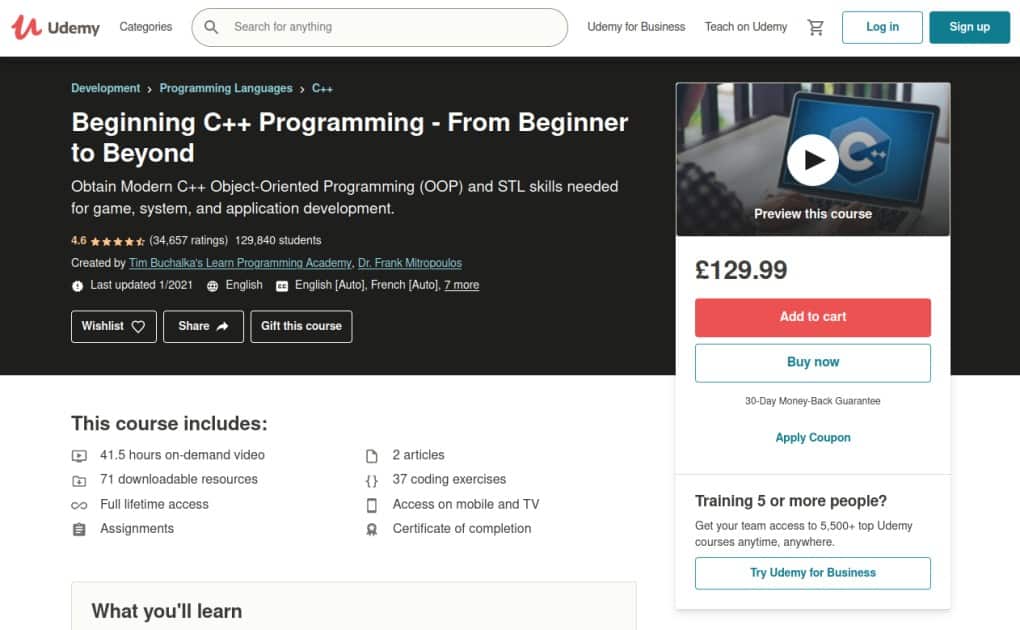
- Resource Type: Course
- Price: $180.00
- Audience: Beginner
Featuring 41.5 hours of on-demand video and 37 coding exercises, this course will help you learn the fundamentals of C++. This course is more expensive than others covered in this article, but it goes into significant detail and covers even more advanced topics. This course is a good place to go for all of your beginner needs, from basic syntax to more advanced topics you need to know before you use C++ in the workplace.
C++ in One Hour a Day by Siddhartha Rao
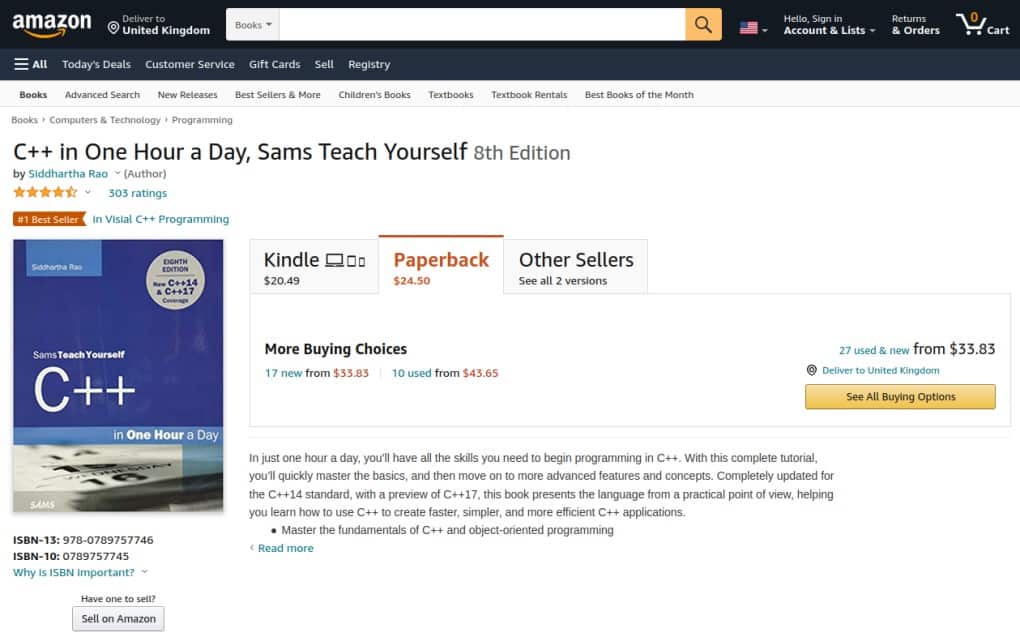
- Resource Type: Book
- Price: $24.50
- Audience: Beginner
C++ in One Hour was written to help you learn C++ at your own pace. Requiring no previous programming experience, this book will teach you how to write fast and efficient programs. You will pick up the basics like using variables and conditional statements. Then, you will move on to more advanced topics like object-oriented programming and the Standard Template Library (STL).
Communities for People Studying C++
There are plenty of communities online to which you can turn when you are learning C++. Communities are useful because they give you a place to go with questions or to help other people fix issues they are experiencing. By joining a community, you can also stay up-to-date with the latest updates and conventions related to C++.
Below, we list a few top communities for C++ development.
C++ Language Slack
Maintained by the C++ Alliance, this Slack channel is a great place to ask questions about C++ and learn from other programmers. This community is run on Slack so you can ask questions in real-time and view previous discussions.
#include <C++>
The #include <C++> community is a global Discord group for C++ developers to chat. Open to all developers, from beginners to experts, you can join in discussions about the language and ask your own questions about C++.
Stack Overflow C++
Best suited to those who already know a bit of C++, the Stack Overflow C++ questions may come in handy. This site is a massive repository of questions and answers and is a good place to turn if you are stuck or need help understanding a C++ concept. You can ask questions or provide answers to the ones other people have.
How Hard Is it to Learn C++?
C++ is not known as a beginner-friendly language due to its syntax and some complicated concepts. C++ is arguably harder to learn than other programming languages. That does not mean that it is impossible to learn: with the right devotion and enough time, you will be able to successfully learn C++.
Will Learning C++ Help Me Find a Job?
C++ is an in-demand skill in the job market which means that the job prospects for people with this skill are strong. To show you how learning C++ could help you boost your career, we have collated data on salaries, job openings, and industry growth.
- Salaries: According to PayScale, a prominent salary website, the average C++ developer earns $70,469 per year. As you acquire experience, you may be able to access higher salaries.
- Job Openings: At the time of writing this article, there are 43,872 jobs listed on Glassdoor that require knowledge of either C or C++ (these two languages are quite different but are grouped together on a Glassdoor search).
- Industry Growth: The U.S. Bureau of Labor Statistics estimates jobs in software engineering, where C++ is prominently used, will grow by 22% between 2019 and 2029. Although not all new jobs will require C++, you can bet that companies will continue to need C++ developers for a long time.
Conclusion: Should You Learn C++?
C++ is a widely valued skill in the job market. Because the language was built for general purposes, C++ has been applied to fields as different as game development, embedded systems development, and data science. Indeed, learning C++ does not pin you into one career: C++ gives you the tools you need to explore many different fields.
C++ has a more complex syntax than other languages, so you may find it more difficult to learn. That said, some beginners do choose C++ as their first language. You should ask yourself: why are you interested in learning C++? Your answer to this question will inform your next steps.


